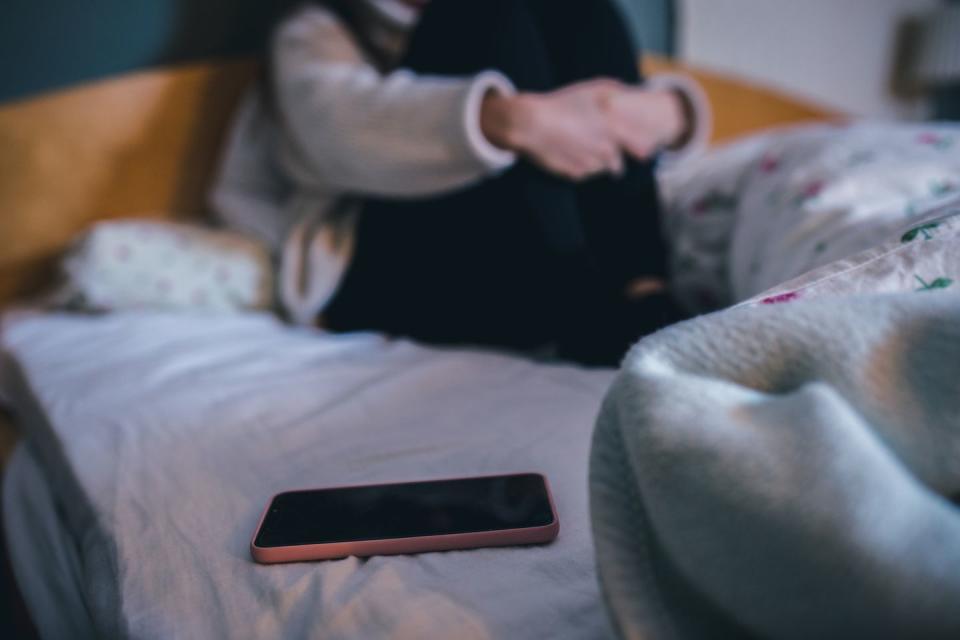There's a psychological reason why you read so much about coronavirus

Coronavirus is pretty much all the world has thought and spoken about for the past two months. And if you're anything like us, you've been reading up on the advice and trying to stick to reliable sources for information (like Public Health England or the World Health Organisation). However, that doesn't stop us scrolling through Twitter in the depths of the night, compulsively consuming stories that are terrifying...
Now, a new study has shed some light on why that might be – apparently it's all about tapping into the feeling of being in control. Chinese researchers have discovered although there was a 74% drop in emotional well-being during the pandemic overall, those who felt knowledgable about COVID-19 fared best, irrespective of whether or not they were actually were knowledgable about the disease. They've deduced that it all stems back to feeling in control, which reduces anxiety.
“Regardless of [the participant's] actual level of knowledge, those perceiving themselves as more knowledgeable, can better shield their emotional well-being from declining during an outbreak," said the authors, Haiyang Yang and Jingjing Ma, who compared two sets of data from over 11,000 people – one from December 2019 and a second from February 2020.

So that's one reason why we can't stop reading the news, but why else do we do it? Especially when eading upsetting stories can really impact mental health in a negative way – one horrible tweet about a person who's died, and your mood can plunge.
Dr Elena Touroni, a consultant psychologist and co-founder of The Chelsea Psychology Clinic, insists "we don’t set out with the intention to scare ourselves." Instead, she explains that "obsessively checking and searching for information is what we call a 'safety behaviour', and it’s driven by the need for reassurance."
This 'safety behaviour' is similar to behaviour that's seen in OCD, notes the psychologist. "Feeling anxious about something and using compulsions as a way of managing that anxiety is common for a lot of anxiety disorders," Dr Touroni tells Cosmopolitan UK. But the problem is, "the 'safety behaviour' that was supposed to relieve the anxiety often ends up amplifying it."
There's another reason we seek to consume a constant stream of coronavirus content, even if it ends up making us feel worse: a drive to understand what on earth is going on.
"When we’re faced with so much uncertainty, we’re going to be drawn to anything that helps us gain some understanding of what’s happening," says Dr Touroni. "The goal is to gain mastery over something which feels scary and unpredictable, but the strategy itself can end up increasing our anxiety."

When you think about it like that, you can understand a little better why you're logging on to Twitter 65 times a day, or why you're watching publications' coronavirus live updates like a hawk. But this kind of perspective can also empower you to step away, if it's causing harm.
Our mental health is important, but it's vulnerable right now. We're not necessarily in the position to soothe ourselves with our usual comforts; seeing friends, going shopping, working out in the gym. And we've got a whole lot of time on our hands to reflect on the devastation that's currently happening worldwide.
So do yourself a favour and tear yourself away from social media if it's making you stressed; you're not going to learn anything that will change the course of the pandemic. Instead, focus on new ways to soothe yourself indoors, while adhering to the government's strict instructions to social distance.
I, for one, can highly recommend a 1,000 piece puzzle to take your mind off things.
Follow Cat on Twitter or Instagram.
Like this article? Sign up to our newsletter to get more articles like this delivered straight to your inbox.
You Might Also Like

 money
money 